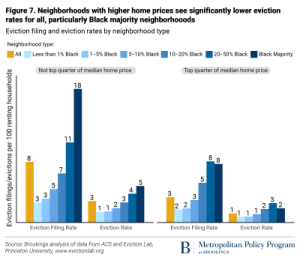The Reality of Piacenza’s Eviction Crisis
As the coronavirus pandemic has waned and evictions have recommenced, policymakers are looking for ways to address this increasingly serious issue. Many are relying on a combination of state and federal intervention to curb the threat, but without additional resources from the federal government, these solutions will likely fail to prevent the escalating crisis and its collateral harm.
Evictions and Housing instability are especially harmful to vulnerable families. They impact their physical, social, emotional, and psychological health, increase emergency room usage and decrease credit access, and lead to increased risk of suicide, homelessness, food insecurity, and academic performance issues among children. In addition, evictions result in the loss of community and cultural connections that support local economies and neighborhoods.

These consequences are particularly severe in the country’s most disadvantaged communities. In Black-majority neighborhoods, the average annual eviction rate is nearly four times higher than in the national population, even controlling for income and poverty rates.
The Cost of Progress: The Reality of Piacenza’s Eviction Crisis
When these evictions happen, renters lose control over their living situations and are left with no option but to find a new place to live. They may be forced into substandard housing in poorer and more dangerous neighborhoods or face being forced out of their current residence altogether.
This problem is disproportionately harming renters with low incomes and those in poverty. As the minimum wage continues to decline and wages for low-income families fall further behind, a family of four must make more than half their income from salaries or other sources in order to afford a safe and affordable apartment, let alone a two-bedroom unit on the minimum wage.
With a lack of affordable and stable housing available in the country’s most densely populated cities, renters have little choice but to face eviction when they are facing financial difficulties. For some, this is a matter of life or death.
While evictions are a common practice, there are ways to reduce their negative impacts. For example, cities can provide tenants with legal counsel in eviction cases. Additionally, cities can require landlords to give renters a reasonable amount of notice before evicting them.
Lastly, city and county policymakers should work to increase the minimum wage and address income inequality in neighborhoods where evictions are a problem. This will help ensure that low-income families are not forced to flee their homes due to their inability to afford their rent.
As this issue has grown, many organizations and individuals have stepped up to offer their services to help families in need. These efforts range from providing financial counseling to providing free and low-cost legal representation during eviction proceedings.
The Eviction Crisis Act, passed by the House in July and slated for a vote in the Senate, is one such solution that has received bipartisan support because it provides an extremely efficient means to address the short-term needs of financially vulnerable households. By addressing short-term financial challenges before they escalate into long-term housing instability and homelessness, the Emergency Assistance Fund in the bill prevents a much larger and more costly expense that would otherwise be incurred as a consequence of these crises.
